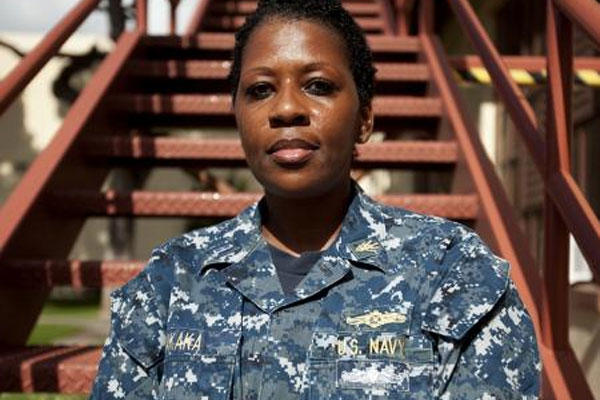MARINE CORPS BASE HAWAII - Millions of pink ribbons are hung across the nation, pink paraphernalia is being worn and even National Football League players are donning pink this month, all representing a cause higher than the individual – the search for a cure.
Breast cancer survivors have many faces. Thousands of men and women diagnosed with the disease each year come from all walks of life, but share a similar battle for their existence. One face ordinary to a cancer survivor is strength.
The month of October is dedicated as Breast Cancer Awareness Month. The month is a collaboration of medical organizations, businesses, communities, government agencies and public service organizations nationwide, working to raise awareness about the disease, which kills nearly 40,000 a year, according to http://www.breastcancer.org/.
Navy Chief Warrant Officer Vanderla Akaka is many things. She is a single mother, a 22-year sailor as well as a breast cancer survivor – twice.
Akaka, the training standards officer with Afloat Training Group Middle Pacific on Naval Auxiliary Landing Field Ford Island, Hawaii, is one of eight Pink Power Mom recipients. The national award seeks to highlight moms who have survived breast cancer and help their communities. She is the first armed forces recipient chosen for the award. She will be receiving her award in Atlanta February 2014.
Growing up in a poor section of Chicago, Aka joined the Navy, determined to be the best at everything she accomplished. Earning many awards throughout her career she was also one of the first female sailors to be involved with the Women at Sea Program in 1995.
Akaka said her life was forever changed in 2008 when she found a lump in her left breast. The lump was diagnosed as breast cancer later that year.
“I went completely numb,” Akaka said. “I couldn’t hear anything, I think I went deaf and numb. I could see his mouth moving. I didn’t know whether I was going to live or die. All I heard was the word cancer, I didn’t know what was going to happen.
“I was raised to be tough by my dad,” she added. “He told me to be tough and don’t cry. When you hear that C word, ‘you have cancer,’ what else are you going to do. I cried.”
A lumpectomy, chemotherapy and radiation treatments followed the diagnosis Akaka in 2008, proving effective and sent her into remission.
The treatment for the cancer, however, left an aftershock of effects to her body.
Cancer cells grow quickly and chemotheraphy is designed to kill fast growing cells. While the radiation takes care of the cancer, healthy cells get in the way and are damaged by the treatments, according to http://www.cancer.org/treatment/treatmentsandsideeffects/.
Cysts were found in her uterus in 2009, weight struggles followed due to hormone imbalance, she underwent a hysterectomy and was sent into full menopause at the age of 35.
Struggling to meet military weight and physical standards pushed Akaka to work harder – she succeeded.
“I never failed a (Physical Readiness Test) and I never plan to,” Akaka said. “My command was very supportive.”
Though she endured hardship in the first three years of her remission, she felt on top of the world knowing she was cancer-free. Her comfort quickly dissipated upon receiving a phone call in 2012, following her regular check up, cancer had returned.
Akaka said the news was hard to hear, but she felt stronger. She knew the process, which questions to ask and had a positive support group.
This time, Akaka made the decision to undergo a bilateral mastectomy, understanding that removing her breasts greatly reduces the chance of cancer returning but does not eliminate it.
A mastectomy is a surgery which removes all breast tissue from a breast as a way of treating or preventing breast cancer.
“I’m still waiting for my new ones to come in by the way,” Akaka joked. “I have to laugh, because if you don’t laugh you cry.”
Akaka juggled the usual efforts of meeting the military standards, long separations from her son, the toll cancer took on her physical appearance and side effects of medication which left her exhausted.
“It rips you as a woman,” Akaka said. “Part of our femininity is our hair and our breasts, when you lose that, you feel incomplete.
“It was hard to get up and look at myself in the mirror with a bald head,” she added. “Some mornings I didn’t want to get up, some mornings it was hard to get out of bed. No hair, no breasts, you feel like crap. I had to push myself to get out of bed.”
The 39-year-old from humble beginnings is known for taking life’s ugly circumstances and transforming them to beautiful learning experiences.
“You just have to put your priorities in order, know what’s important and don’t work yourself to death,” Akaka said. “I want to share with everybody.
“I think we are born to serve,” she added. “I’ve always been that way. I grew up with parents who brought children in to feed. We barely had food for ourselves. We just have to look at what’s important.”
For women in the U.S., breast cancer death rates are higher than those for any other cancer, besides lung cancer, according to http://www.breastcancer.org/. Besides skin cancer, breast cancer is the most commonly diagnosed cancer among American women. Just under 30 percent of cancers in women are breast cancers.
One in eight women will develop invasive breast cancer over the course of their life time and men have a one in 1,000 chance of developing the disease.





























